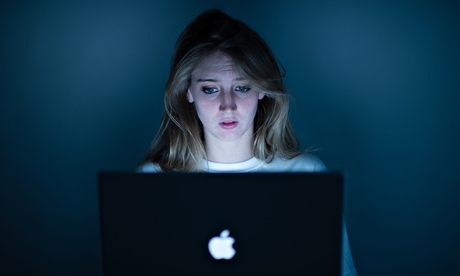
Some ideas sit in your imagination, incubating for a long while before you are ready to write them down: Web of Darkness was one of these. I knew I wanted to write a book about stalking, but as always with my stories, it was never going to remain so simple. I began to find articles about online bullying and identity amongst British teens, and even more disturbing reports of people across the world – their identities stolen, their bank accounts emptied, and their lives turned completely upside down. Over the course of three years, my original idea filled out, until finally it was ready.
Part of my story development stage involves talking to young people. I'm privileged enough to be popular and in demand for school events and often I'll discuss aspects of new ideas with the people I meet. For Web of Darkness, I began by asking teens about their online privacy, and whether they thought about such things.
I was truly surprised that the first "internet generation" seemed so relaxed about it all. Many of the people I talked to had the most basic of security settings, but thought nothing of using the same password for every account, or letting their friends know what those passwords were. From Facebook to email to everything else, it seemed as though many found online security a chore and weren't too concerned about it. Many actively sought out ways to bypass security systems, both at home and in school, and were far more tech savvy than their parents.
Then I read something about the psychological profile of Internet trolls, and my plot began to become more solid. According to research, online trolls exhibit signs of sadism and psychopathy. They revel in the manipulation of others, often showing complete disregard for morality. A few quick straw polls amongst my teenage audiences showed that perhaps one in 10 of them engaged in trolling and were happy to admit to it, too. Were these teenagers really immoral sadists who enjoyed messing with the lives of other human beings? I have always been fascinated with the dark side of human nature – what Jeff Lindsay, who created the brilliant Dexter series of novels, calls the 'dark passenger' – and my imagination went into overdrive.
Once these pieces were in place, I had three central characters. The first two, Lily and Tilly, were always going to be ordinary British girls in year 11. A huge part of their social lives were conducted online; they represented the teens I'd met and spoken to whilst developing my story. Next came The Spider – the embodiment of the psychological traits I'd been reading about, but with a darker dimension added. All that remained were more characters (or victims!).
One afternoon, I read a BBC News article that almost brought everything together. What if, whilst downloading free software, music, films, torrents etc, people were unwittingly allowing hackers access to their computers? What if those same hackers could take over your laptop, with very little chance of you ever knowing? What if someone could turn your webcam on and watch or record your most private moments?
The stories I read about Remote Access Trojans (RATS), online bullying and stalking were chilling. Subsequently, my plot became very dark; in the real world, things were even darker. From teenage suicides, to identity theft, to threats of violence – the Net was suddenly a place of lurking danger. However, these stories only cover the surface – there is a whole world underneath the internet we all use, an estimated nine times bigger and hidden from view - called dark web or Deep Web. Down there, the most evil of human behaviours was being played out on a daily basis. It was where terrorists, drug dealers and paedophiles hid – and it was the final piece that I required for my plot.
Web of Darkness is a scary, disturbing and challenging read. I wrote it in exactly the same way I might have written it had my protagonists been adults. The only difference is that Lily and her friends are young adults. From the moment the story opens, every single aspect mentioned above, and many others, informed and shaped my plot. I wanted to it to be a dark but entertaining story, whilst also challenging readers to think about their own activities online. If reading my book makes you tighten up your security settings, think twice about downloading something or posting comments or photographs and just be more wary of people you 'meet' online – that's great. First and foremost though: enjoy – and try not to let it give you nightmares!
Bali Rai's book Web of Darkness is available from the Guardian bookshop.

